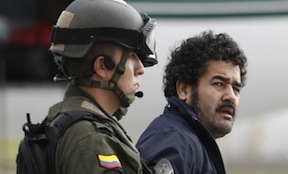A US federal court has sentenced Diego Perez Henao, alias “Diego Rastrojo” — a former top leader of Colombia’s Rastrojos criminal organization — to 30 years in prison, closing yet another chapter for the greatly diminished crime syndicate.
Perez pleaded guilty to trafficking 81,000 kilos of cocaine between 1994 and 2008, initially alongside the now deceased drug trafficker Wilber Varela and later as part of the Rastrojos criminal group, reported El Tiempo. In addition to his prison sentence, the court ordered Perez to pay a fine of $1 million and imposed a five-year probation period following the completion of his sentence, reported El Colombiano.
According to the Associated Press, Perez initially accepted drug trafficking charges in January, which included conspiracy to manufacture and distribute cocaine intended for trafficking to the United States.
Perez was captured in Venezuela in June 2012 and extradited to the United States in August 2013. He still faces charges in Colombia for 66 homicides committed between 2008 and 2012 in Colombia’s southwestern department of Valle del Cauca.
InSight Crime Analysis
Perez initially founded the Rastrojos as the military arm of a faction of the Norte del Valle Cartel (NDVC). He later supported Javier Calle Serna, alias “Comba,” when he killed Varela, an NDVC leader, and seized control of the organization. Under the leadership of Diego Rastrojo, Comba and his brothers, and Daniel Barrera, alias “El Loco,” the Rastrojos became one of the most powerful drug trafficking organizations in Colombia. At the height of its operations, the group had a presence in more than a third of the country’s provinces and was a major cocaine supplier for Mexico’s Sinaloa Cartel.
The Rastrojos suffered major blows in 2012, however, when two of the Calle Serna brothers — Javier and Luis Enrique — surrendered, and the third brother, Diego Rastrojo and Loco Barrera were all captured. The group now reportedly operates in small, localized cells.
SEE ALSO: Diego Rastrojo Profile
The hefty sentence handed down to Perez is likely in part a product of his failure to hand himself in early to US authorities. Unlike Perez, Comba was quick to cut a deal with the US Drug Enforcement Administration (DEA) when he saw trouble on the horizon. Terms of such an agreement are likely to have included a shorter prison term and the guaranteed protection of family members in exchange for providing intelligence — which may have included information leading to Perez’s arrest. It has been rumored Comba will receive 15 years and has offered his properties up in exchange for his brother’s pardon.

